I’m grateful for calm and ease and peace. I’m grateful for faith and knowing that whatever is ahead will be ok. I’m grateful for a day to myself. I’m grateful to see a little more of the life I'm meant to lead every day. I’m grateful to be sober today.
I wrote this piece, “My First Alcoholic,” about my grandfather and his friend, Hank, who I’m pretty sure was an alcoholic. It first “appeared” in Paulina Pinsky’s fantastic newsletter: newly sober. A lot of the important people in my life were born and sometimes died this time of year, so it’s always a pretty big stewpot of memories—and for me, one of the many ancillary tasks of sobriety is working through the memories and making sure they’re sorted and stored correctly. That sounds mechanical and it’s anything but…I hope you like reading My First Alcoholic. If you want to read it on the website:
My First Alcoholic.
I don’t come from a family of alcoholics. My parents didn’t really drink when I was growing up, really no one in my family drank very much. Then there was me and my alcoholism, glowing bright, the only star in a dark sky. I started drinking at 15 or 16 and had the grand realization when I was 18, sitting by myself in a grungy, black vinyl booth at a dive bar in Iowa City, listening to “Strange Magic” on the jukebox:
I was an alcoholic.
Well, I didn’t use that word then—alcoholics were people whose lives were almost gone, wraiths that inhabited heating vents, VA Hospitals and the like. Their lives had mostly wasted away and mine was all in front of me.
I grew up in Iowa City and my grandparents, my Mom’s parents, lived in Moline, Illinois, 60 miles east on Interstate 80. Moline is one of the Quad Cities; Moline and Rock Island in Illinois and Davenport and Bettendorf in Iowa—split by the Mississippi River. When we visited, which was a lot, I loved going across the old bridge—the river was so wide, it took us a whole minute to cross it!
My grandfather, well, we could call him eclectic. He was born in 1911 and grew up with his three brothers on a farm near Columbus, Wisconsin that happened to be very close to the farm where my grandmother and her three sisters grew up.1
He was planning on going to college, but the depression intervened, so instead, he sold produce from the farm on a truck in Madison and supplied produce and eggs to a lot of the fraternity houses. I know he watched those college students pretty wistfully. He was incredibly talented with his hands, was an amazing mechanic and carpenter—he refinished a lot of really beautiful antique furniture and even re-caned chairs that are still in use today. After he retired, he did some painting, started making jewelry and he carved some gorgeous troll-themed Christmas ornaments that I treasure.
On the Chesapeake Bay circa 1982
Moline was an industrial town, there were Alcoa and International Harvester plants and John Deere was headquartered there. My grandfather worked at a factory that made heating and cooling equipment and I always loved riding with my grandmother when she picked him up after work. He came home, always took a bath, and then got dressed for dinner. During the days, when my grandmother was trying to manage me and my brother, she often resorted to pointing at the yardstick hanging above the basement door and saying with her most menacing look, “do you want Grandpa to hear about this?” When disciplinary proceedings were necessary, my grandfather would hear the case after his bath but before dinner. The yardstick never came down off the pegs, unless we had to measure something.
My absolute favorite thing was what happened after dinner. My grandfather’s basement was a completely wondrous place. Not that it was elegant or nice, it was cramped, with the joists visible above and a concrete floor. It was dank, dark and spooky and it was my favorite place in the whole world. The basement was where my grandfather kept his tools, his guns (he was a hunter), his fishing equipment (an excellent fly fisherman) and an actual 20 foot long archery range (he and his brother-in-law made an annual pilgrimage to South Dakota to go bow hunting—there are no trophies).
After dinner, we’d go downstairs and it was just magical. We’d make things, I learned how to use the tools and would help him make tables and bookshelves and all sorts of stuff. He’d pull down the guns and show me how to use them, how to clean them and then we’d have imaginary hunts from the stools by the big counter—all manner of pretend wildlife met their end in that basement thanks to my skill with that unloaded 30.06. I learned how to tie flies and shoot a bow and arrow. All in my grandfather’s basement. The house they rented also had a garage, set back on the alley and that was where the real action was.
My grandfather sometimes bought wrecked cars from the rental agencies, fixed them up and resold them for a pretty tidy profit. My brother drove a ridiculously large Chrysler Imperial for a while. My grandfather was definitely a pirate and if you wanted proof, he actually helped me build a working go-cart, with a steering wheel salvaged from an old Ford Galaxy and a Briggs & Stratton 2.5 hp lawnmower engine. This thing was like a rocket and, in retrospect, highly, highly dangerous. It stayed in his garage in Moline for a long time and when he finally brought it down to Iowa City, my mother banned it after the maiden voyage—my brother managed to hit the side of the house on the first try. I’m not sure who was more disappointed, me or my grandfather. I could see some pretty ferocious hissing going on as my mom questioned my grandfather’s judgement and directed that the Go-Cart must never be driven again. When we sadly loaded the Go-Cart back into his car, he whispered, “don’t worry, it’s not going anywhere.” He gave a conspiratorial chuckle and his eyes were twinkling. He kept it hidden in the back of the garage for occasional, very secret joyrides in the alley.
My favorite story? I was a 3rd Grader when he deemed me old enough to go on an actual fishing trip. We went to Prairie Du Chien (yes, this means “prairie dog” in French), where he often fished and rented a cabin. My grandmother was along, but spent her days in the cabin reading tabloids and movie magazines and smoking. I’ll never forget waking up super, super early and pulling on clothes against the chill of a late summer morning, I remember getting drenched by the dew as we bushwhacked our way to one of his preferred spots along the river.
Taken that fateful morning…
Not too much later, a fly he was casting got embedded in the crown of my head. It hurt—a lot—he was examining it and I was kind of whimpering and scared, and I didn’t even notice that he had gotten his ever-present Swiss Army knife out of his pocket. He pulled me in pretty tight to him and deftly cut open my scalp—made a quick perpendicular cut so he could pop the barbed hook out of my head. Zap! —it was over and I don’t think I felt anything. There was a fair amount of blood, which did unnerve me. After he calmed me down and cleaned me up, and of course, had a cigarette, he very matter of factly said “I don’t think there’s a reason to mention this to your Mom or Grandma—would just upset them.” I nodded solemnly and we went back to fishing.
When I visited, I loved going with him on errands. We’d stop by the corner grocery and chat with his friend Jerry. He’d always introduce me as “Grandpa’s Oldest Boy,” which I loved. Sometimes our errands involved a visit to his friend Hank. Hank lived in a very small, pretty shabby apartment. He was a tall, angular man, with a mop of grayish hair and a small mustache. He was almost always wearing a bathrobe when we visited. We’d bring groceries, things my grandmother had made for him and we’d sit and chat while he and my grandfather smoked.
I didn’t really know many details and when my grandparents talked about him, my grandmother always called him “poor Hank.” I knew Hank had served in Korea. I knew that something had happened to his wife and that he had a daughter maybe, but never heard about her or saw her. Hank always seemed very sad and the few times I can remember being outside with him, he just kind of shuffled along.
I never saw Hank drink, but I’m pretty confident Hank was an alcoholic. When I first saw the picture of Bill sitting with Bill Dotson, AA #3, let’s just say it looks exactly like I remember Hank. The only other hard evidence is the plaque with a pair of hands praying and the words to the Serenity Prayer, propped up on his nightstand. I didn’t realize the significance of that until I was at one of my first AA meetings.
When Hank died, my grandparents cleaned out his apartment and kept some fishing stuff and the plaque with the serenity prayer. We were headed to South Dakota on a driving vacation and re-jiggered the schedule so we could go to the Quad Cities for Hank’s funeral. It was just the six of us there, the organist asked my grandmother if Hank had any favorite hymns and she immediately responded, “What a Friend We Have in Jesus.” I don’t know if Hank actually liked that song, I’m not a fan, but it was my grandmother’s favorite. The too-sweet, treacly melody on that little console organ is the soundtrack for that memory. It’s one of the saddest memories I have.
When I had that moment of clarity at 18, sitting in that awful, black vinyl booth—the oh, fuck, how is this ever going to end moment—the moment I knew I didn’t have the ability to stop drinking—the word “alcoholic” wasn’t yet in my lexicon, but I thought about Hank. In 2018, when things were very, very dark for me. There were two visions in my head that I didn’t want to come true. One came from seeing my Mom in an ICU bed after a heart attack, frail and defenseless and near-death. Even sitting in the ICU drunk, I couldn’t bear the idea of putting my kids through that, didn’t want them to have to watch me in some hospital somewhere as I slowly killed myself drinking. The other terrifying vision was Hank in his bathrobe.
The thing that’s really moving is the love my grandfather showed for a broken-down alcoholic. Sometimes, I feel like I learned everything I needed to know in my grandfather’s basement. He taught me how to hunt, fish, tell jokes, roll cigarettes, play blackjack, play poker, get away with minor misstatements, and how to love alcoholics. I guess that last one was a lesson someone thought I would need eventually.
When I did my 5th Step in a monastery in Dubuque, and had admitted the exact nature of my devastating wrongs to kind Brother Xavier, he looked over his glasses at me as I sagged in the chair across from him, and asked,
“Do you think there is anyone who could love you after all of that?” Of course, I knew the answer.
My grandfather died when I was a young lawyer. I had spent the weekend at the hospital and there was no question about where things were headed. He knew, too. I had to leave on Sunday night and my heart was breaking, I knew I wouldn’t see him again. I explained why I had to go, the ridiculous, unmovable trial schedule in a case in Atlanta, how sorry I was to leave, he cut me off, held my hand really firmly and his blue eyes twinkled. He smiled and said, “Don’t worry, I’ll see you around, it’s not like I’m going anywhere,” and gestured to all the stuff he was attached to. We sat for a few more minutes and then I had to go, as I leaned down to kiss him goodbye, he held me tight for a minute and whispered, “the knife is in the drawer next to my chair.”
I got to the house and made a beeline for his big recliner. It was the chair he sat in when he watched Cubs games and taught me to keep score, the chair where he told the best stories about hunting adventures that I now know mostly didn’t happen. It’s the chair where he kept two small boys completely enthralled. It’s where he played checkers, leaning back, feet up, while he directed my brother’s moves against me. He was really, really good at checkers, I never came close to beating him and I’m pretty glad about that.
There was a little chest of drawers on the table next to his chair. It’s where he kept various treasures—he rolled his own cigarettes for a long time and all of those supplies were in there. But the most precious object was the Swiss Army knife. I held it in my closed hand for a long time and thought about a lot of things. I put it in my pocket and headed for Chicago to get home.
He died a couple of days later. His nearly last words to me were prophetic; I carry him with me everywhere I go. He had an open heart, a slightly devious mind and a truly subversive sense of humor. He was married to my grandmother for nearly 60 years2, went to church every Sunday, loved his Grandsons more than anything and took care of his alcoholic friend until he died. He hung Hank’s serenity prayer plaque on the wall in the kitchen.
Yes, he made an ashtray with my baby photo. Mom was not a fan. Yes, I’ve used it and he did, too.
I treasure every memory and realize how lucky I was to have him in my life. He taught me a lot of the things I needed to know and do. He taught me how to get myself out of tight situations with a joke and a wink. He taught me the Pirate Code and the importance of loyalty. He taught me that you could love an alcoholic—and that was maybe the most important thing. He was gone years before I got sober, but I knew he was there that afternoon in the Monastery, I could still feel how much he loved me.
I didn’t tell the story about him cutting the hook out my head until five years after he died. Technically, the Pirate Code might require more than that, but it’s too good a story to not tell. I know he agrees.
Thanks for Letting Me Share
Paul, George…Carl and Henry meet Clarice, Bernice, Lila and Gertrude. For real.
This did not stop him from introducing my grandmother as “My first wife, Bernice,” for all of those sixty years.


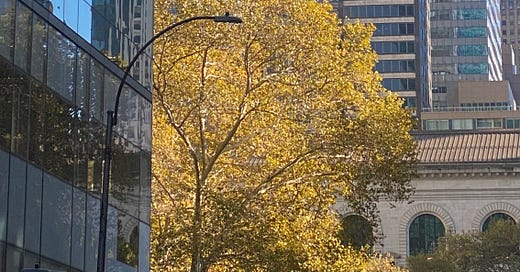



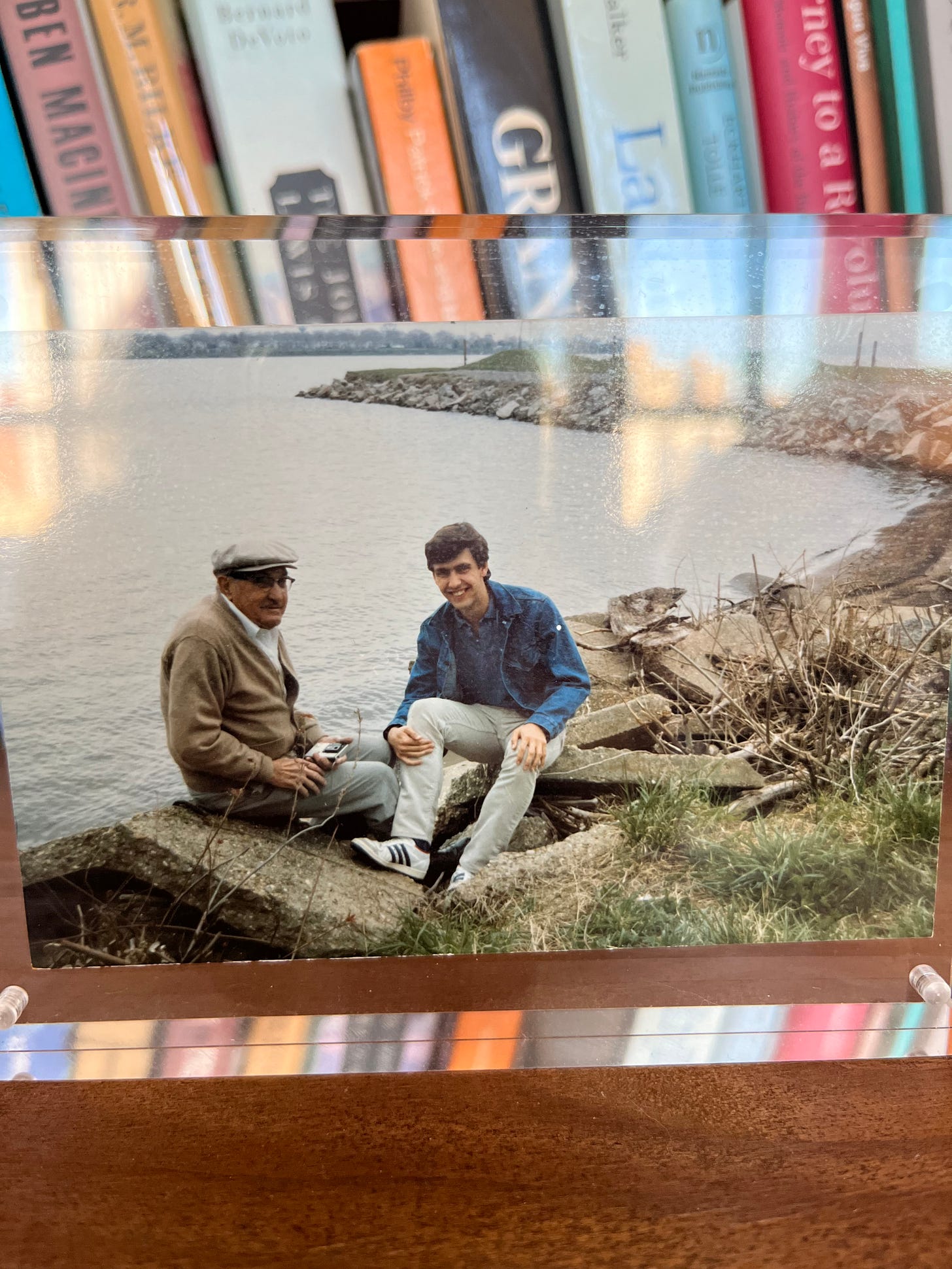
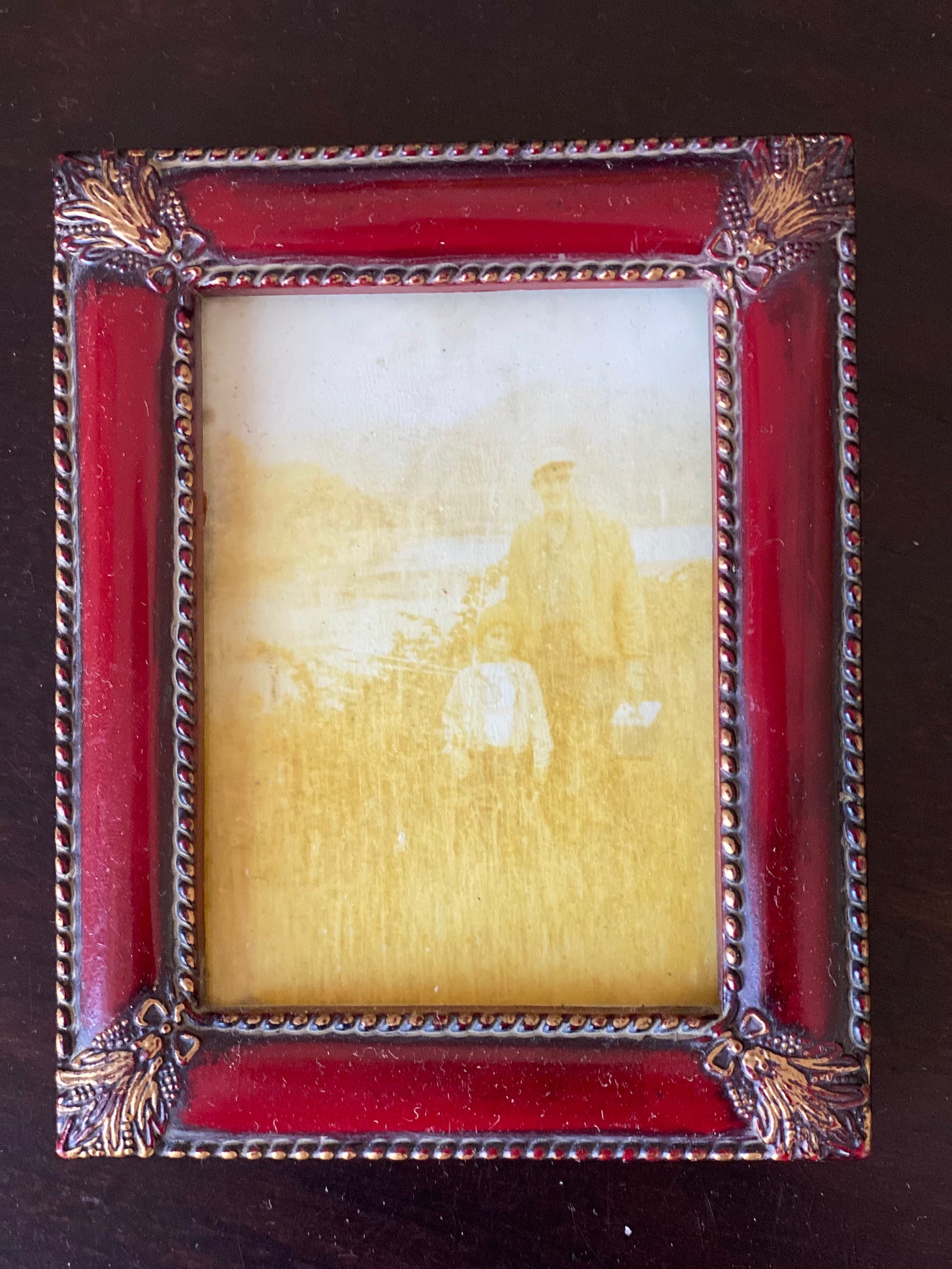
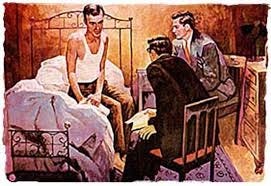
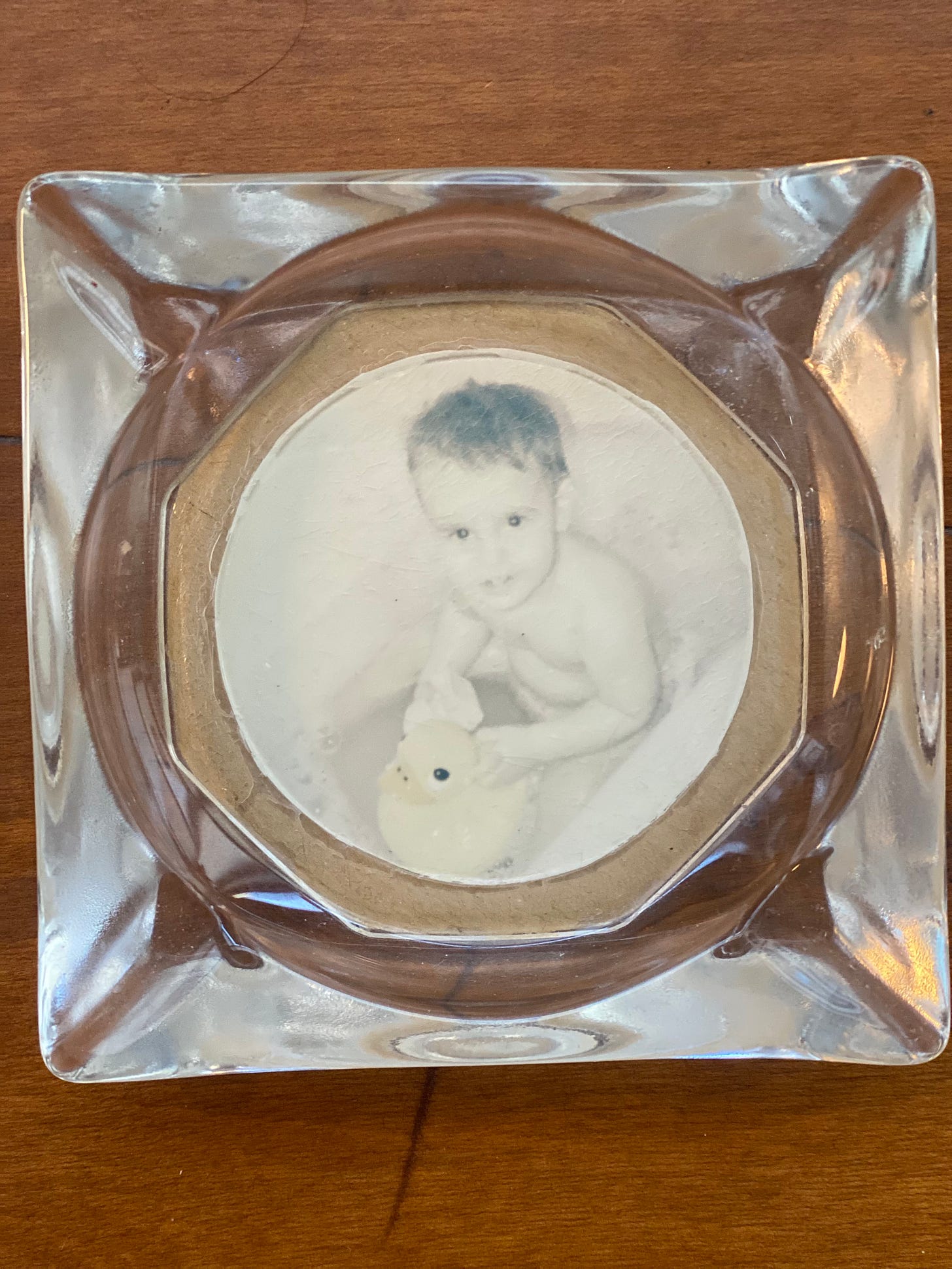
Before Mike and I married, the pastor asked us separately when did we know we wanted to marry the other. What did it? He told us the answer at the actual ceremony. On one of our early dates we were browsing in a thrift store. As we picked up a relic here and there, we each told stories about our grandparents and their important influence in our lives. Mike told me stories of hunting with his grandfather. And he noted how I spoke respectfully with kindness and attention to the grandfatherly shopkeeper and his wife. We love these kinds of stories.
So it should be no surprise that I had to read this one aloud as we drank coffee this morning. So much beauty in these remembrances and stories. What an amazing, imperfect man who left a legacy of loving the unloveable. That’s worth more than any inheritance. Well, except maybe a Swiss Army knife.
Good write. Brings back good memories and a gentle reminder to make those memories with our kids and grandkids. Your descriptive words is a style I like and plan to carry onto a novel I am almost finished with. Thanks.